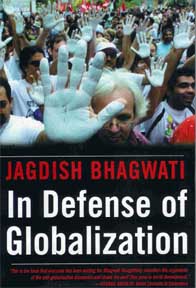Apr 16, 2024
Apr 16, 2024
 The celebrated economist that wrote this book needs hardly an introduction. Perhaps the name awarded to him by left wing sympathizers through out the world ought to summarize it all. He's been called 'the world's foremost free trader' for many years now. Undoubtedly one of the strongest candidates to be knocking on the Nobel Prize's door for decades now, Bhagwati summarizes his perspective on globalization, a much talked about phenomenon especially in recent decades. Bhagwati deals a mortal blow to the arguments of celebrated economists like Amartya Sen and Joseph Stiglitz, rendering much of them paralyzed. Perhaps it's the title of Stiglitz's book (Globalisation and its Discontents) that prompted Bhagwati to title his book like he has. Bhagwati writes persuasively and has facts, common sense and historical evidence to back his points. Coupled with that is his uncanny witticism clad sarcasm that reduces his opposing arguments to the stature of rodents.
The celebrated economist that wrote this book needs hardly an introduction. Perhaps the name awarded to him by left wing sympathizers through out the world ought to summarize it all. He's been called 'the world's foremost free trader' for many years now. Undoubtedly one of the strongest candidates to be knocking on the Nobel Prize's door for decades now, Bhagwati summarizes his perspective on globalization, a much talked about phenomenon especially in recent decades. Bhagwati deals a mortal blow to the arguments of celebrated economists like Amartya Sen and Joseph Stiglitz, rendering much of them paralyzed. Perhaps it's the title of Stiglitz's book (Globalisation and its Discontents) that prompted Bhagwati to title his book like he has. Bhagwati writes persuasively and has facts, common sense and historical evidence to back his points. Coupled with that is his uncanny witticism clad sarcasm that reduces his opposing arguments to the stature of rodents.
The core of Bhagwati's argument revolves around the debate over the economic implication of globalization, especially in the developing world. Too much has been written about how bad is economic integration, how it has led to ruination in poor countries and how organizations like the WTO and IMF are really satanic in fervor. For Bhagwati, the question whether globalization is good or bad is fruitless. He devotes his time to arguing that not only globalization is good, but has a potential to do far more. This distinguished Columbia economist shows through empirical analysis and evidence that poor public policy outlook in regions such as East Asia and Latin America are the main causes of their financial meltdown and not free trade itself. Bhagwati consistently shows the fruits of open trade have brought to countries across the world, poor or rich, and how it could be pursued further. In essence, globalization does not need a 'human face'- it already has one- more so than the opposers of free trade. Bhagwati identifies the evils often associated with globalization to poor governance, hegemonic tendencies of developed countries, hypocritical double standards in international organizations and pure ignorance. Thus he relieves free trade from these erstwhile shackles, arguing that it is the single most important phenomenon to material well being of the nations of the world. In all, the book moves forward at blistering pace, demolishing every pseudo edifice of mercantilism on the way, providing sizzling entertainment to the reader.
However, reservations could be made about two arguments in the book. Firstly, his argument, the classical liberal one put forward by Adam Smith and David Ricardo, of 'comparative advantage' is not convincing enough. It is true that most countries will indeed find their niche in the world market to develop their unique selling points, but at least in two circumstances this could not be the case- 1) the country concerned having no resources to base exports on and 2) a country's companies being wiped out at their infant stage by giant MNCs and thus it being dependent on MNCs for employment and imports for consumption which potentially has national security implications for that country. To resolve this, surely we need to return to the Smith and List's notion of 'infant industry protection', whereby a potentially competitive industry needs some breathing space to realize its full competitiveness before being exposed to the cutthroat competition in the international market. Perhaps Bhagwati means so, but his argument is not always clear on this issue.
Secondly, his arguments on multiculturalism being facilitated through globalization are rather idealistic. Indeed, certain aspects of Oriental cultures have made a great impact on the Occident, but surely the control of the channels through which these interactions can occur by the 'west' undermines this whole process. As a result, in countries in India, the youth have increasingly failed to distinguish anything native and western merely as 'different' but have invariably placed them in a ladder of superiority-inferiority, with the Indian counterpart always occupying the latter rung. This ultimately deals a blow to the pride and confidence of the nation concerned.
These reservations aside, a work that is no doubt nothing short of a masterpiece from a scholar from who we have now gotten used to receiving classics.
14-Nov-2004
More by : Aruni Mukherjee